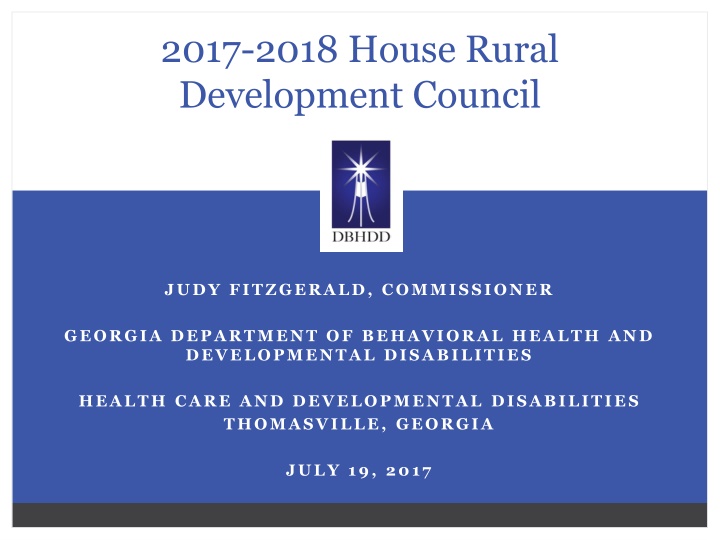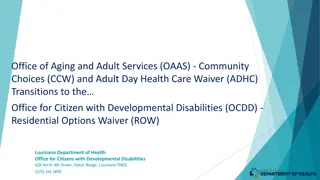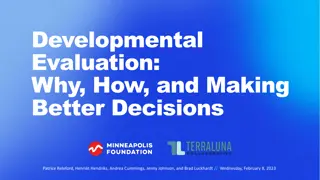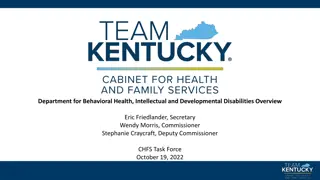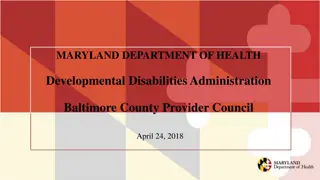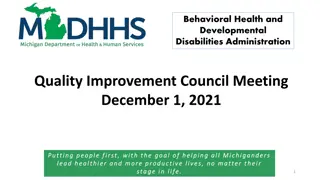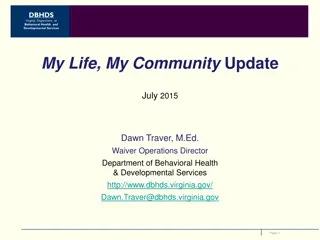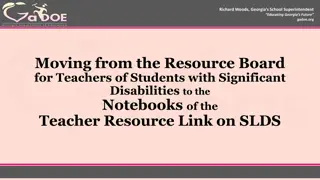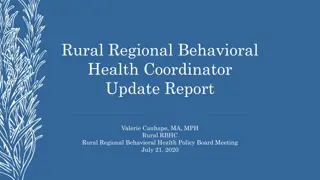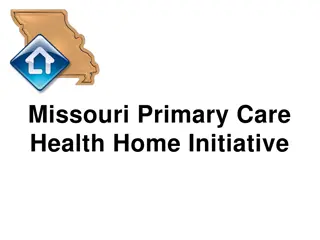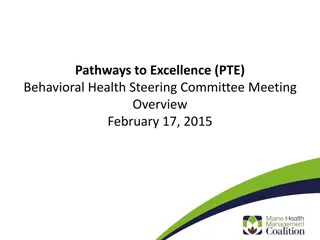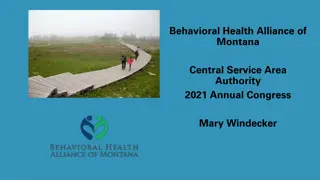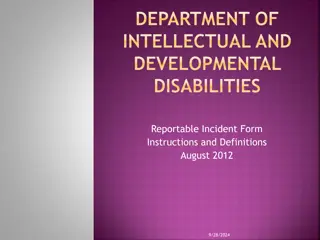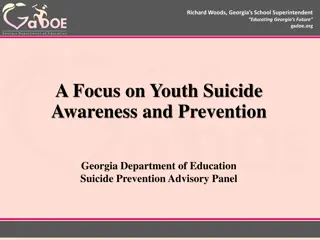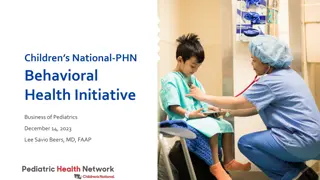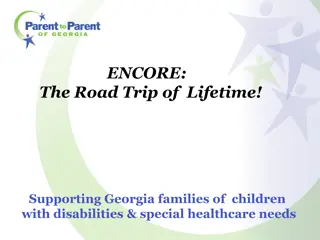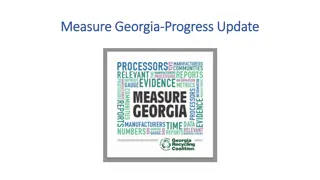Georgia Department of Behavioral Health and Developmental Disabilities Initiatives
The Georgia Department of Behavioral Health and Developmental Disabilities focuses on providing high-quality care for individuals with behavioral health challenges and developmental disabilities. Their mission is to support Georgians through an effective continuum of care, promoting independence and recovery. Initiatives include community-based programs, easy access to care, a focus on transitioning individuals to community living, and enhanced support coordination.
Download Presentation

Please find below an Image/Link to download the presentation.
The content on the website is provided AS IS for your information and personal use only. It may not be sold, licensed, or shared on other websites without obtaining consent from the author.If you encounter any issues during the download, it is possible that the publisher has removed the file from their server.
You are allowed to download the files provided on this website for personal or commercial use, subject to the condition that they are used lawfully. All files are the property of their respective owners.
The content on the website is provided AS IS for your information and personal use only. It may not be sold, licensed, or shared on other websites without obtaining consent from the author.
E N D
Presentation Transcript
2017-2018 House Rural Development Council JUDY FITZGERALD, COMMISSIONER GEORGIA DEPARTMENT OF BEHAVIORAL HEALTH AND DEVELOPMENTAL DISABILITIES HEALTH CARE AND DEVELOPMENTAL DISABILITIES THOMASVILLE, GEORGIA JULY 19, 2017
Vision Easy access to high-quality care that leads to a life of recovery and independence for the people we serve Mission Leading an accountable and effective continuum of care to support Georgians with behavioral health challenges, and intellectual and developmental disabilities in a dynamic health care environment Georgia Department of Behavioral Health and Developmental Disabilities 2
From the Hospital to the Community DBHDD S CONTINUUM OF CARE COMMUNITY CONTINUUM FOR INTELLECTUAL AND DEVELOPMENTAL DISABILITIES A LIFE IN THE COMMUNITY ENHANCED TRANSITION PROCESS Georgia Department of Behavioral Health and Developmental Disabilities 3
DBHDDs Continuum of Care Average Daily Census at Southwestern State Hospital in FY 2009: Adult Mental Health: 56 Intellectual and Developmental Disabilities: 126 2010 settlement agreement with U.S. Department of Justice Service drivers and fiscal realities Hospital closure: December 31, 2013 Georgia Department of Behavioral Health and Developmental Disabilities 4
Community Continuum for Intellectual and Developmental Disabilities Partnership with individuals and their families Placements reflecting individual needs and preferences Services close to home and in the most integrated setting Georgia Department of Behavioral Health and Developmental Disabilities 5
A Life in the Community Independence Meaningful and Fulfilling Life New Experiences Members of the Community Making Friends Reconnecting with Family Georgia Department of Behavioral Health and Developmental Disabilities 6
Enhanced Transition Process Created Office of Transitions and Office of Health and Wellness (2015) Implemented Intensive Support Coordination Support coordinators for each individual; actively engaged throughout transition process Continued monitoring of individuals after transition Enhanced Provider Capability Georgia Department of Behavioral Health and Developmental Disabilities 7
Community Behavioral Health Services IMPACT OF SETTLEMENT AGREEMENT SERVICES ON CONTINUUM OF CARE BEHAVIORAL HEALTH CRISIS CENTERS ADDITIONAL SETTLEMENT SERVICES MOBILE CRISIS RESPONSE TEAMS Georgia Department of Behavioral Health and Developmental Disabilities 8
Impact of Settlement Agreement Services on Continuum of Care Unprecedented level of support from Governor Deal and the General Assembly Evidence-based practices for community care New resources for community-based services across the state, such as behavioral health crisis centers in Albany, Thomasville, and Valdosta Nearly $18 million new dollars invested annually in Region 4 to expand infrastructure and community-based services Georgia Department of Behavioral Health and Developmental Disabilities 9
Behavioral Health Crisis Centers 24/7, short-term, walk-in crisis intervention with emergency receiving capability and crisis stabilization beds Assessment, counseling services, and referrals for ongoing care De-escalation of crisis situations and prevention of out-of-community treatment or hospitalization Increased access to care Reduced burdens on hospitals and law enforcement Georgia Department of Behavioral Health and Developmental Disabilities 10
Behavioral Health Crisis Centers Thomasville Georgia Pines Community Service Board Emergency receiving facility for law enforcement 24 beds, 6 temporary observation beds Average annual investment of more than $5 million Georgia Department of Behavioral Health and Developmental Disabilities 11
Behavioral Health Crisis Centers Albany Aspire Behavioral Health and Developmental Disabilities Emergency receiving facility for law enforcement 30 beds, 6 temporary observation beds Average annual investment of more than $5 million Georgia Department of Behavioral Health and Developmental Disabilities 12
Behavioral Health Crisis Centers Valdosta Behavioral Health Services of South Georgia Emergency receiving facility for law enforcement 24 beds, 6 temporary observation beds Average annual investment of more than $5 million Georgia Department of Behavioral Health and Developmental Disabilities 13
Adult Mental Health Beds in Region 4 Then 67 beds at Southwestern State Hospital (2013) Now 96 beds at 3 behavioral health crisis centers Access to beds in private psychiatric facilities Georgia Department of Behavioral Health and Developmental Disabilities 14
Additional Settlement Services Assertive Community Treatment Behavioral Health Crisis Centers Case Management/Intensive Case Management Community Support Teams Crisis Respite Apartments Projects for Assistance in Transitions from Homelessness Supported Employment Supported Housing Georgia Housing Voucher Program Bridge Funding Georgia Department of Behavioral Health and Developmental Disabilities 15
Mobile Crisis Response Teams 24/7 community crisis response, de-escalation, and stabilization delivered by a team of peers and behavioral health professionals who provide referrals for after-care services Available in all 159 counties in Georgia Average response time: 1 hour or less Georgia Department of Behavioral Health and Developmental Disabilities 16
Mobile Crisis Data April 2017 # Dispatched # of Counties Using Service Average Response Time Average Assessment Time Diversion Rate Total AMH C&A 1,270 932 338 126 59 minutes 76 minutes 93.45% Georgia Department of Behavioral Health and Developmental Disabilities 17
State Targeted Response to Opioid Crisis Grant THE CRISIS GRANT OVERVIEW FUNDING AMOUNT AND REQUIREMENTS DBHDD RESPONSE Georgia Department of Behavioral Health and Developmental Disabilities 18
The Crisis In 2015, 1,307 Georgians died from a drug overdose 68% due to opioids 10-fold increase in prescription opioid overdose between 1999 and 2014 55 Georgia counties above U.S. average overdose rate Georgia Department of Behavioral Health and Developmental Disabilities 19
Grant Overview 2-year grant that aims to address the opioid crisis by Increasing access to treatment, Reducing unmet treatment need, and Reducing opioid overdose deaths through the provision of Prevention Treatment, and Recovery activities for opioid use disorder (including both prescription opioids and illicit drugs, such as heroin) Awarded to DBHDD providers across Georgia Year 1 implementation: June 1, 2017-April 30, 2018 Georgia Department of Behavioral Health and Developmental Disabilities 20
Funding Amount and Requirements $11,782,710 per year for two years At least 80% or grant award must be spent on opioid use disorder treatment and recovery support services Up to 5% of award can be used for administrative/ infrastructure costs Georgia Department of Behavioral Health and Developmental Disabilities 21
DBHDDs Response Increased access to medication-assisted treatment (MAT) for Medicaid-enrolled individuals through provider network change Active partnership with state departments of Public Health, Community Health, and Human Services on opioid related issues (crisis and ongoing planning) Georgia Department of Behavioral Health and Developmental Disabilities 22
Statewide Media Campaign Increase awareness about opioid misuse and abuse Educate public about the problem and available resources Reduce stigma Promote Georgia s Good Samaritan Law Prevention activities include: Kickoff event Public service announcements Radio ads Georgia Department of Behavioral Health and Developmental Disabilities 23
Expansion of Medication-Assisted Treatment Expand detox capacity Increase residential bed capacity Provide training on best practices Provide MAT pharmacy benefit Georgia Department of Behavioral Health and Developmental Disabilities 24
Naloxone Education and Training Naloxone/NARCAN training for first responders, including law enforcement, ambulance drivers, emergency room professionals, and fire fighters, as well as community service board staff Prevention activities include: Distribution of Naloxone/NARCAN kits Training and education events Georgia Department of Behavioral Health and Developmental Disabilities 25
Recovery Services and Peer Support Increase peer support throughout the state Implement new recovery approaches to educate people on the many pathways of recovery Enhance collaboration in recovery-oriented system of care Activities include: Implementing Peer Support Warm Line Peer specialist in hospital ERs Training and education events Georgia Department of Behavioral Health and Developmental Disabilities 26
School Mentor and Strategic Prevention Framework (SPF) Opioid Pilot Programs School Transition Mentor Program Opioid prevention education program and tool kit for use during key transitional periods SPF Pilot Program Increase the number of SPF prescription drug prevention providers in Georgia, with an opioid focus Prevention activities include: Increasing awareness Education/training Improving collaboration and coordination of prevention Georgia Department of Behavioral Health and Developmental Disabilities 27
24/7, free, confidential, and statewide access to services Georgia Department of Behavioral Health and Developmental Disabilities 28
